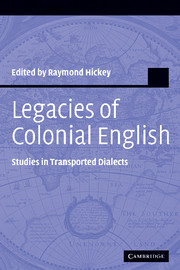Book contents
- Frontmatter
- Contents
- List of figures, maps and tables
- Contributors
- Foreword
- Introduction
- Part I Out of Britain
- Part II The New World
- 4 The emergence of American English: evidence from seventeenth-century records in New England
- 5 The language of transported Londoners: third-person-singular present-tense markers in depositions from Virginia and the Bermudas, 1607–1624
- 6 Remnant dialects in the coastal United States
- 7 Back to the present: verbal -s in the (African American) English diaspora
- 8 ‘Canadian Dainty’: the rise and decline of Briticisms in Canada
- 9 The legacy of British and Irish English in Newfoundland
- 10 The English dialect heritage of the southern United States
- 11 Solving Kurath's puzzle: establishing the antecedents of the American Midland dialect region
- 12 English dialect input to the Caribbean
- Part III The southern hemisphere
- Part IV English in Asia
- Appendix 1 Checklist of nonstandard features
- Appendix 2 Timeline for varieties of English
- Appendix 3 Maps of anglophone locations
- Glossary of terms
- General references
- Index of names
- Index of languages and varieties
- General index
5 - The language of transported Londoners: third-person-singular present-tense markers in depositions from Virginia and the Bermudas, 1607–1624
Published online by Cambridge University Press: 22 September 2009
- Frontmatter
- Contents
- List of figures, maps and tables
- Contributors
- Foreword
- Introduction
- Part I Out of Britain
- Part II The New World
- 4 The emergence of American English: evidence from seventeenth-century records in New England
- 5 The language of transported Londoners: third-person-singular present-tense markers in depositions from Virginia and the Bermudas, 1607–1624
- 6 Remnant dialects in the coastal United States
- 7 Back to the present: verbal -s in the (African American) English diaspora
- 8 ‘Canadian Dainty’: the rise and decline of Briticisms in Canada
- 9 The legacy of British and Irish English in Newfoundland
- 10 The English dialect heritage of the southern United States
- 11 Solving Kurath's puzzle: establishing the antecedents of the American Midland dialect region
- 12 English dialect input to the Caribbean
- Part III The southern hemisphere
- Part IV English in Asia
- Appendix 1 Checklist of nonstandard features
- Appendix 2 Timeline for varieties of English
- Appendix 3 Maps of anglophone locations
- Glossary of terms
- General references
- Index of names
- Index of languages and varieties
- General index
Summary
Introduction
In present-day US southern basilectal speech, the third-person-singular present tense is marked with both -s and zero. African American Vernacular English speakers and Southern White Vernacular English speakers both use the zero morpheme to mark this slot, but in differing amounts, with some AAVE speakers presently using it more frequently than SWVE speakers. This chapter will discuss some historical data which contain both -s and zero, namely, the speech of prisoners transported from London in order to populate the Virginia settlement of Jamestown, from 1607 onwards. The data, taken from the manuscript Minutes of the Court of Governors of Bridewell and Bethlem for the years 1559–1624, are viewable on microfilm in the Guildhall Library, London.
Third-person-singular present-tense zero: previous studies
For a discussion of the third-person-singular -s and zero in AAVE and SWVE, see, for example, Fasold (1981), Sommer (1986), Poplack and Tagliamonte (1989, 1991, 1994), Baugh (1990), Ellis (1994), Montgomery, Fuller and DeMarse (1993), Montgomery and Fuller (1996), Wolfram, Hazen and Tamburro (1997), Winford (1998: 106), Montgomery (1999). Much of this work is devoted to analysing usage of -s vs. zero in various speech communities, black and white, past and present; considering whether third-person-singular zero was present in earlier states of English; and to debating whether the presence of zero supports the hypothesis of a creole origin for AAVE.
- Type
- Chapter
- Information
- Legacies of Colonial EnglishStudies in Transported Dialects, pp. 158 - 171Publisher: Cambridge University PressPrint publication year: 2005



